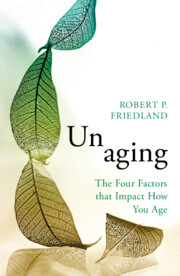Book contents
- Unaging
- Reviews
- Unaging
- Copyright page
- Dedication
- Contents
- List of Figures and Tables
- Preface
- Part I Foundations: What Do We Need to Know about Optimal Aging?
- 1 Aging Is Not Inevitable, It Is an Opportunity
- 2 The Theory of the Multiple Reserve Factors
- 3 The Brain Is Not an Organ, It Is the Master
- 4 Memory and Cognition
- 5 The Neurodegenerative Diseases of Aging
- 6 Stroke and Vascular Cognitive Impairment
- 7 Other Dementias
- 8 Our Microbiota and How to Do Gene Therapy in the Kitchen
- 9 The Health of the Body and the Physical Reserve Factor
- 10 Depression, Anxiety, and What Good Is Feeling Bad?
- 11 Genetics Aren’t Everything
- Part II Applications: What Can We Do about the Opportunity of Aging?
- Part III Conclusions
- Acknowledgments
- Glossary
- References
- Index
3 - The Brain Is Not an Organ, It Is the Master
from Part I - Foundations: What Do We Need to Know about Optimal Aging?
Published online by Cambridge University Press: 15 September 2022
- Unaging
- Reviews
- Unaging
- Copyright page
- Dedication
- Contents
- List of Figures and Tables
- Preface
- Part I Foundations: What Do We Need to Know about Optimal Aging?
- 1 Aging Is Not Inevitable, It Is an Opportunity
- 2 The Theory of the Multiple Reserve Factors
- 3 The Brain Is Not an Organ, It Is the Master
- 4 Memory and Cognition
- 5 The Neurodegenerative Diseases of Aging
- 6 Stroke and Vascular Cognitive Impairment
- 7 Other Dementias
- 8 Our Microbiota and How to Do Gene Therapy in the Kitchen
- 9 The Health of the Body and the Physical Reserve Factor
- 10 Depression, Anxiety, and What Good Is Feeling Bad?
- 11 Genetics Aren’t Everything
- Part II Applications: What Can We Do about the Opportunity of Aging?
- Part III Conclusions
- Acknowledgments
- Glossary
- References
- Index
Summary
Understanding of the magnificence and uniqueness of the brain is important for realizing the goals of aging. We must respect its central role in our lives and work to see what we must do to enhance its health throughout life. The brain is precisely responsive to activities and its structure is changed by learning. It is also uniquely sensitive to damage and has a limited capacity for repair, compared to other body parts. What we do changes the brain, and the nature of our mental activities modifies the ability of the brain to resist declines with aging and disease. Cognitive involvement in educational, occupational, and recreational tasks throughout life, as well as physical activities, helps to enhance resistance to decline with age and diseases such as Alzheimer’s. This chapter examines how the four reserves (cognitive, physical, psychological, and social) help to maintain brain function with age. Recent research has uncovered the influence of our partner microbes in the gut on learning, memory, and age-related diseases of the brain. These developments beautifully illustrate how there are things we can all do to maintain brain function with age.
Information
- Type
- Chapter
- Information
- UnagingThe Four Factors that Impact How You Age, pp. 42 - 59Publisher: Cambridge University PressPrint publication year: 2022
